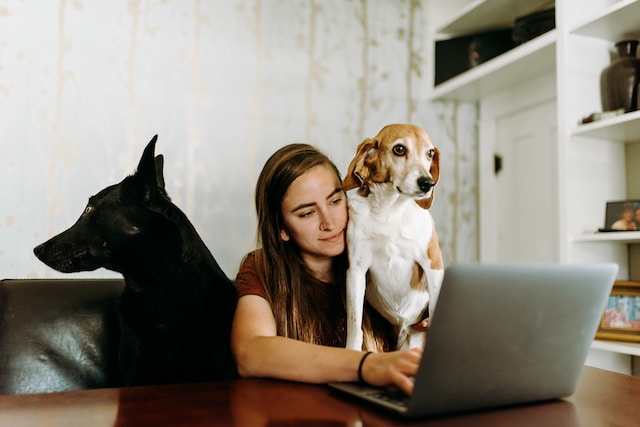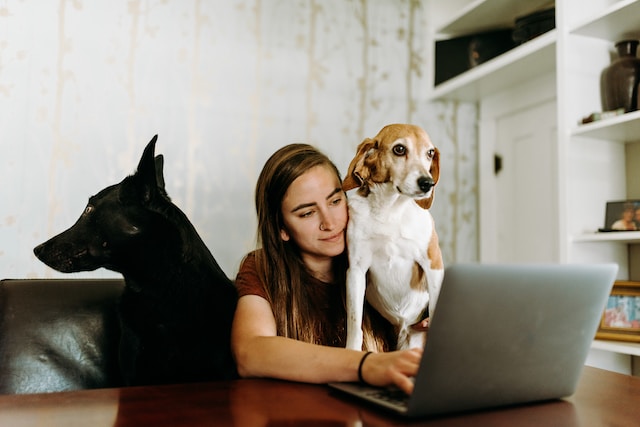
Embracing Furry Friends: Should Co-Working Spaces Allow Dogs?
The concept of co-working spaces has rapidly gained popularity in recent years as more people opt for flexible work arrangements. These shared workspaces foster a dynamic and collaborative environment that promotes productivity, networking, and a sense of community among individuals from various professional backgrounds. While co-working spaces have been designed with humans in mind, there’s an ongoing debate on whether they should also open their doors to our four-legged companions – dogs.
In this blog, we’ll delve into the pros and cons of allowing dogs in co-working spaces to shed light on whether this idea is a barking success or something that might leave a few tails between legs.
What are the Benefits of Allowing Dogs in Co-Working Spaces?
- Stress Reduction and Increased Well-being: Numerous studies have shown that interacting with dogs can significantly reduce stress and anxiety levels in humans. The presence of dogs can create a more relaxed atmosphere, leading to increased productivity and overall well-being among co-workers.
- Enhanced Work-Life Balance: Many co-working space members are remote workers or freelancers, who might sometimes feel isolated or lonely during long work hours. Allowing dogs in the workspace can provide much-needed companionship, encouraging a healthier work-life balance.
- Fostering a Positive Work Culture: Welcoming dogs can create a more laid-back and accepting work culture. It encourages employees to bring their whole selves to work, leading to increased job satisfaction and a more inclusive atmosphere.
- Networking Opportunities: Dogs can act as conversation starters, breaking down barriers between co-workers who might not have interacted otherwise. This can facilitate networking and collaboration among individuals with diverse skills and expertise.
What are the Drawbacks of Allowing Dogs in Co-Working Spaces?
- Allergies and Health Concerns: Not everyone may be comfortable around dogs due to allergies or other health reasons. Co-working spaces must take these considerations into account to ensure the well-being of all their members.
- Distractions and Noise: While dogs can be great stress-relievers, they can also be a source of distraction. Barking, playfulness, or simply the presence of a dog can disrupt focus and concentration for some co-workers.
- Potential Conflicts: Not all dogs are well-behaved or socialised. There’s a risk of conflicts arising between dogs or between dogs and humans, which can lead to tense situations in the workplace.
- Liability and Cleanliness: Co-working spaces allowing dogs must carefully consider the liability involved in case of any accidents or injuries caused by dogs. Additionally, cleanliness and hygiene are essential factors to maintain a professional environment.
So what are the potential solutions?
To strike a balance between accommodating dog lovers and maintaining a productive workspace, co-working spaces can implement certain guidelines:
- Pet Policy: Establish a clear and comprehensive pet policy that outlines rules and responsibilities for dog owners. This can include requirements for vaccinations, training, behavior, and supervision.
- Designated Dog-Friendly Areas: Set aside specific areas within the co-working space for dogs, ensuring that those who prefer a dog-free environment can work undisturbed.
- Trial Periods: Consider implementing trial periods to gauge the impact of allowing dogs and gather feedback from co-workers before making a final decision.
- Regular Assessments: Regularly assess the impact of the pet policy on the overall workspace environment and make adjustments as needed based on feedback and observations.
The question of whether co-working spaces should allow dogs is not a simple one-size-fits-all answer. While dogs can undoubtedly bring joy, stress relief, and a positive atmosphere to the workplace, their presence may not be suitable for everyone. Striking a balance between dog-friendly policies and maintaining a professional and inclusive workspace is crucial. By setting clear guidelines, considering the needs of all co-workers, and being open to feedback, co-working spaces can create an environment that embraces furry friends while fostering a productive and harmonious community. After all, a workspace where dogs and humans coexist happily might just be the paw-fect place to thrive in this modern working world.
Categories
- Business advice
- Coworking
- Mental Health
- News & Events
- Remote working
- Service updates
- Uncategorised
